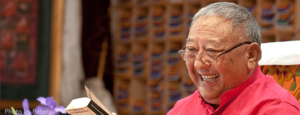Good morning everybody and welcome to this Sunday talk. As you know, these Sunday talks are very much focused on how to live our life and how to maintain our daily life. We begin with the motivation and by now we are a little familiar at least with the recommended motivation of bodhimind. We also call it, “the precious bodhimind,” because it considers that others’ needs are more important than our own. It is very easy for me to say, but any one of us will find it very difficult to practice and carry out, because, “me,” and my needs, are so important. I am a very important person, I cannot be ignored. And then, people also carry that, “I have been ignored,” “I am have been misplaced,” “I have been looked down on.” That becomes painful and people will carry that pain for years. That’s why thinking, “my needs,” being lesser important than others’ needs is difficult. Those who can do it are called precious, because it becomes precious.
We did that for quite a long time, quite in detail. So we are quite familiar with that. Then the actual bodhimind we also talked about. To have such a mind we need to recognize what it is. We did talk about it, briefly saying it is the mind which is seeking total knowledge for the service of all beings. You yourself are not excluded, but not necessarily emphasized, but it is for all, A-L-L beings. In one way it is totally dedicated, on the other hand, you yourself is seeking total knowledge. When you are dedicated, you are volunteering to do the job. When you want to do the job, you need the tools to be able to make the attempt to complete it. For that you need total knowledge.
So seeking total knowledge for oneself to serve all beings – that is bodhimind. It is like a little twist and turn, however, that becomes ultimate, unlimited, unconditioned love and compassion. It is definitely ultimate and definitely unconditional and definitely has no limits. So it is something extremely important. It makes a hell of a difference in our daily lives, especially if you have some understanding of karma and if you think that our lives are managed by karma, then it makes a tremendous difference, particularly the action bodhimind.
The other day, I talked about the difference between the wishing bodhimind and action bodhimind. When we want to become fully enlightened, you are wishing full enlightenment for the benefit of all beings, dedicated for the benefit of all beings, wishing for yourself to become fully enlightened. That is simply wishing bodhimind. The earlier masters gave the metaphor: if somebody wants to take a journey, they are wishing to go. That comes first. Then comes actually going, meaning taking action of moving. The wishing bodhimind is really “bodhimind,” sure, but also the action is much more important and effective, and serves the purpose better than anything else. You do need action.
As for action, to make it very brief it is: avoid negativities, build positivities and their consequences. Tame your mind. That is Buddhism. I said that this is Buddha’s own statement paraphrased and it is “bus stop Buddhism.” I am not even going to call it Buddhist. That makes it into something different. Also, I personally don’t like people choosing, “I am Buddhist, I am Hindu, I am this, I am that.” Unless you are really soaked and know exactly what you are doing and where you are going and what it is, I don’t think it is something that is good right now. America is such a young country from the spiritual point of view – although the Judeo-Christian tradition has been here for thousands of years. But all the Asian traditions that have come in are very young here. Buddhism is also extremely young here. Very, very new. Right at this moment, people who are interested in something of the spiritual path, who are dedicated, who don’t denounce or reject anything else – this is the majority of American – shall we say – liberal spiritualists. I don’t think the conservatives will do that. It is really important to focus on what makes a difference to me, what makes a difference to my friends, to my life, to my lives. That’s really a matter that is standing right in front of us, drawing our attention and looking for help.
So I like to bring that also in that manner, rather than through a very deep, philosophical way or even a very deep religious way.
~ Gelek Rimpoche, Jewel Heart Ann Arbor, June 16, 2013


